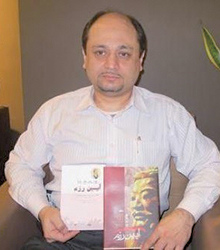|
 |
|
Javad Hosseini, an Iranian scholar (FILE) |
"Every time I read The Art of War, I get new inspirations. The contents of the book are very profound," said Javad Hosseini, an Iranian scholar.
Hosseini came to China from Iran in 1993 and studied in China for nine years. With great passion for Chinese culture, he has read many Chinese classic works including A Dream of Red Mansions, Romance of Three Kingdoms and Journey to the West. Of all the works, he likes The Art of War most and has done research into this book for years.
"If we regard The Analects of Confucius and Mencius as the origins of the Eastern ethics, then The Art of War was undoubtedly the treasure house where wise people from both the West and the East can absorb wisdom," said Hosseini.
The thoughts of Sun Tzu are a treasure for the whole world, said Hosseini. Currently, there is only an English version of The Art of War and other Chinese classics available in Iran. Hosseini took it upon himself to translate the work into Farsi for the Iranian people. His translation was published in Teheran in 2008. As the first Farsi version of the book, it sold very well. The 5,000 copies of its first edition were sold out within a short time and its revised edition has already been put in the market.
To ascertain background knowledge on the book, Hosseini visited north China's Shandong Province, where the book was written, to know more about Sun Tzu and the book. He also attended six international Sun Tzu Symposiums, so as to better promote the book to the Iranian people.
Ancient wisdom has no expiration date. The book is not only a military strategy book, but also an essential manual in business competition and manual of enlightenment in people's life.
Scholars agree that the military strategies in the book are applicable also to the cut-throat business world. As a result, the book has become a compulsory course in many famous business schools such as the Harvard Business School in the United States.
Military and commercial wars are the same at the macro-level, but in today's commercial and industrial areas, strategies are discussed most but understood least, said Hong Bing, a researcher of China's Academy of Military Science and Vice President of the China Research Society of Sun Tzu's Art of War.
Sun Tzu lived in a time when the country was torn by wars. Like in the old days, today's business world is also filled with "wars." In this highly competitive and innovative age, the rule of survival of the fittest still applies.
The laws of competition revealed in The Art of War could help entrepreneurs maintain an invincible place in the competition, said Hong.
For instance, the thought of Sun Tzu—If you know the enemy and know yourself, your victory will not stand in doubt—works well in commercial competition. It requires an entrepreneur to have adequate knowledge of both the company and its competitors. Through careful research, he can find out the company's weak aspects, improve them and thus gain a competitive edge, said Hong.
Therefore, in addition to the military strategy course, he also added the book into his teaching courses.
Despite the huge popularity across the world, the book has not earned much attention among China's younger generations. This has aroused anxiety among Chinese scholars.
"I read The Art of War when I was in high school. It was enlightening but boring. The language is ancient Chinese. It is hard to understand and read," said Lu Xiao, human resources manager of the COFCO Innovative Foods (Beijing) Co. Ltd.
The sharp contrast between the popularity of Chinese classic works outside and inside China is worth reflection, said Shi Tongyu, a research fellow with the Chinese Academy of Social Sciences.
The Art of War became the cumulative sales champion in South Korea. This sales volume didn't refer to the one classic work, but included all kinds of versions adapted based on the work, for instance, adapted version, annotated version, graphical version, comics and entertaining books on love and war, said Shi.
The traditional culture was not fixed or rigid. It could have various forms of interpretation. Every generation had their way in study. Today, the young people prefer direct and simple ways. Modern ways could be used to appeal to the young generation, as long as the spirit and the key contents were stuck to, said Shi.
| 